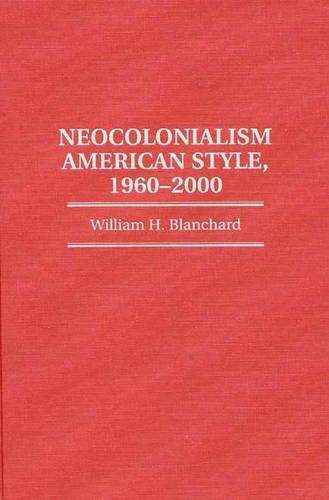
Neocolonialism American Style, 1960-2000
(Hardback)
Publishing Details
Neocolonialism American Style, 1960-2000
By (Author) William H. Blanchard
Bloomsbury Publishing PLC
Praeger Publishers Inc
23rd August 1996
United States
Classifications
Tertiary Education
Non Fiction
Central / national / federal government policies
327.73
Physical Properties
Hardback
208
Description
This is a study of American interventionism and influence over other nations in the late 20th century. The central question raised is whether the United States gains by its symbiotic relationship with authoritarian regimes, such as with Iran under the Shah, Nicaragua under Somoza, and the Philippines under Marcos. Today, while we often hear statements which imply that the U.S. has no national interest which is in conflict with the common good, the long self-searching that followed the Vietnam War should make us more aware of the complexity of American foreign policy and more skeptical of our leaders' enunciation of U.S. national interest. While presidents often make use of the notion of American altruism as a justification for policy (President Bush in Somalia and President Clinton in Haiti, for example), William Blanchard exposes and explores that myth and the conflicts inherent in modern American foreign policy.
Reviews
"A significant contribution to the literature on what is becoming a key debate, central to the future of the United States. Neoimperialism takes many forms, not least cultural and economic--and one suspects that the tensions engendered by U.S. globalized culture will have significant political consequences in the next half century."-Geoffrey S. Smith Professor of History, Queens University, Kingston, Ontario President, Peace History Society
"This is a readable, interesting, and worthwhile book that illuminates ways in which we have unwittingly involved ourselves in neocolonial pursuits in Iran, Nicaragua, and the Phillipines....It is a valuable contribution to the scholarship on peace."-Dan Christie, Professor of Psychology The Ohio State University
"William Blanchard has achieved a deft mixture of highly engaging historical narrative and penetrating insights into American character. He shows how the United States has sought 'neocolonial' domination of other countries--domination achieved without military occupation, and without full awareness among the dominators of their own desire for power. He also shows, in his studies of specific episodes in American neocolonial history--such as our relations with Iran, Nicaragua, and the Philippines--how and why neocolonial policies go wrong. A good read, and an essential companion to other works on American history and foreign policy."-Walter Truett Anderson Fellow, Meridian Institute President, American Division World Academy of Art and Science
Author Bio
WILLIAM H. BLANCHARD, has held positions with the Rand Corporation and the Planning, Analysis, and Research Institute. He is the author of Aggression American Style (1978) and Rousseau and Revolt (1967) and Revolutionary Morality (1984).
